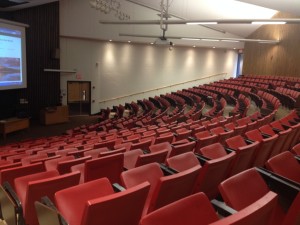As another day of SC200 was drawing to a close and 3:45 loomed around the corner, I noticed a recurring noise that seems to reiterate itself on the eve of class letting out every single Tuesday and Thursday. When the semester first started. this noise didn’t bother me as much. But now, nearly a month into the semester. this sound drives me CRAZY. What is this sound that I am speaking of? This sound is the CLUTTERING of supplies, the SQUEAKING of chairs, and the ZIPPING of backpacks as students try to leave before class is officially dismissed. The sound as a conglomerate is loud, ugly, and awkward; Andrew comes across as a fairly laid back guy, and it’s pretty obvious he’s trying his absolute best to not lose his temper when people pack up early to get out of class a measly 2-3 minutes before 3:45. My built up annoyance to this issue led to me doing a little bit of research on why it is so loud when people pack up, and if the issue is the students, or the design of the Forum itself. But first, to get a back understanding of how sound works, this nifty video below should satisfy any initial questions. Check it out:
Sounds have to travel through a medium. This means that sound has to travel by virtue of something, and in this case it is air. The sound travels through the room (by air) which is how we hear it. Sound is extremely contagious, and when air particles vibrate and spread, this is the result of a sound wave. So when students all pack up at once in a room the size of ours, you can imagine how quickly and noisily the sound travels.
Think of sound in the same context as the heart rhythm monitors relating to Antiarrhythmics that we studied in class today (9/17). The heart monitors and how we measure sound are comparable to ocean waves. The highest part of a sound wave is the crest, and between each wave is what we call troughs. The highest part of a heart monitor indicates the fluctuation of a heart beat. The more sound we make, the higher the length of a sound wave, thus making it louder.
Sound waves lose energy as they travel further. All 300+ of us are compacted into one room, meaning that the sound has nowhere to escape. This explains the higher intensity of the cluttering, squeaking, and zipping.
To wrap things up, the size of the room doesn’t exactly help the problem of sound, but neither does all of the unnecessary noise at the end of class!

